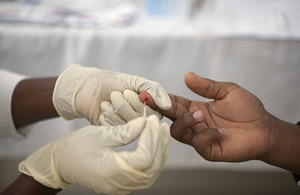DFID Research: The essentials for RDT implementation
A new implementation guide provides the tools to develop well-planned strategies for using rapid diagnostic testing in Malaria control programmes

Picture: Novartis AG/ Flickr
Earlier this year the Foundation for Innovative New Diagnostics (FIND) published an implementation guide for rapid diagnostic tests (RDTs).
The guide provides a step-by-step methodological approach to the use of RDTs as a diagnostic tool in malaria control programmes. However, it highlights the need to view RDTs as one part of any effort to strengthen existing diagnostic services.
Designed for specific audiences- e.g. national malaria programmes focused on sub-Saharan Africa, donors, and public and private sector organizations involved in implementing malaria parasite-based diagnosis agendas- the guide aims to provide comprehensive guidance on how to incorporate RDTs into diagnosis in an effective and strategic manner.
To this end the guide is arranged into three sections:
- Background information on the role of malaria RDTs
- A broad overview of RDT programmes at a national level
- Information on the deployment of RDTs at ground level and how to establish systems for post-deployment monitoring and evaluation
- Information on new technologies likely to come into use in the next few years
The guide provides a toolbox with examples of workplans, budgets and relevant forms that have been used previously in RDT implementation in several countries. The tools are intended to be adapted for the specific needs of the user.
The full guide can be accessed here.
The paper was produced in collaboration with the National Malaria Programmes of Uganda, Tanzania, Senegal and Zambia; the Roll Back Malaria Partnership (RBM); the Malaria Consortium; Medical Care Development International (MCDI), the US President’s Malaria Initiative (PMI), the KEMRI-Wellcome Trust Research Programme, the Pilipinas Shell Foundation, and the African Medical and Research Foundation (AMREF).
FIND aims to develop and implement diagnostic tools that are affordable, accurate and suitable for the particular needs of patients in high endemic countries. It receives funding from DFID.